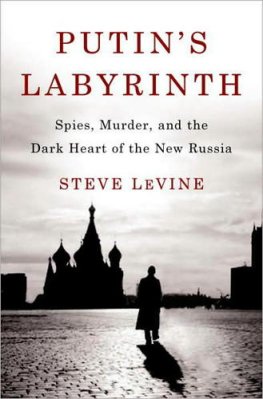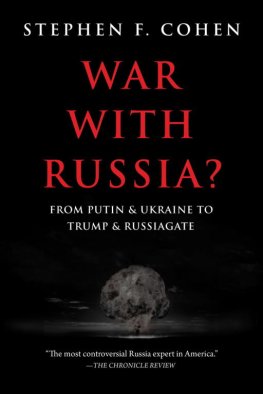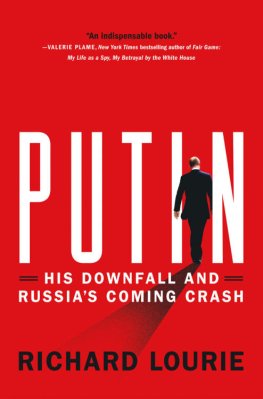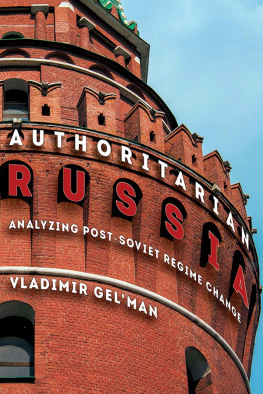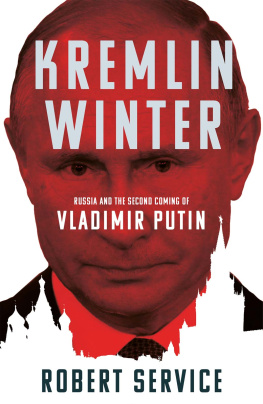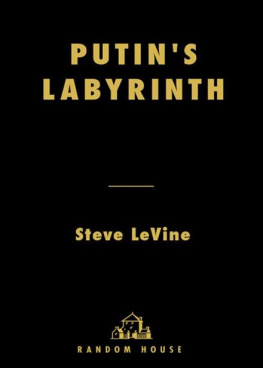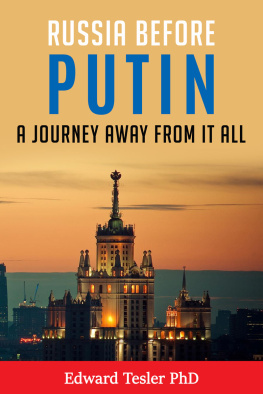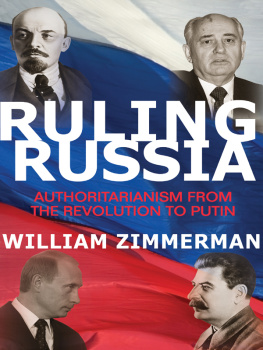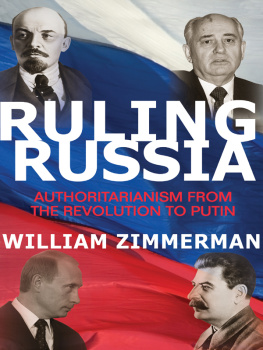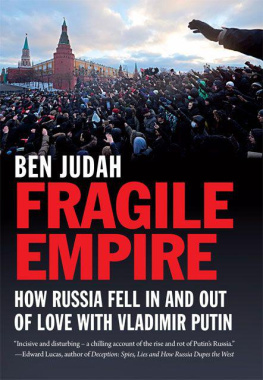
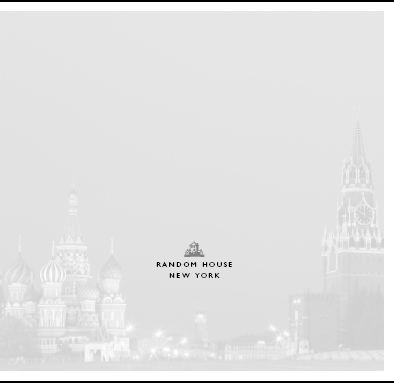
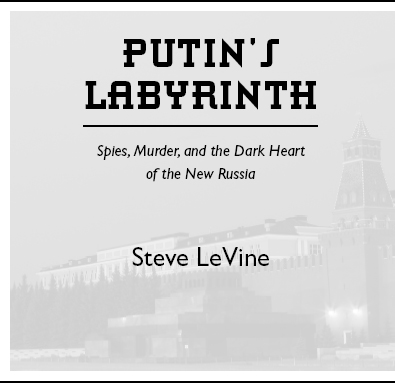
CONTENTS
CHAPTER 1 Russias Dark Side
A Land in the Grip of a Brutal History
CHAPTER 2 How Putin Got Elected
Boris Yeltsin Finds a Guarantor in a Man from Nowhere
CHAPTER 3 Getting to Know The Putin
Morning in Russiaat a Price
CHAPTER 4 Nikolai
The First Victim of Deliberate Nuclear Poisoning
CHAPTER 5 Nord-Ost
Once Again, Mother Russia Fails Her People
CHAPTER 6 The Exiles
Boris Berezovsky and the Sanctuary of London
CHAPTER 7 The Crusading American
Paul Klebnikov and Glorious Russia
CHAPTER 8 Murder on an Elevator
Anna Politkovskaya and the Voiceless of Russia
CHAPTER 9 The Traitor
Alexander Litvinenko: A Defector in London
CHAPTER 10 Polonium
The World Is Witness to an Assassination
For Dolores LeVine
and for
Avery LeVine
PREFACE
Just before midnight on November 1, 2006, Alexander Litvinenko, a former Russian intelligence agent living in political exile in London, awoke terribly sick. Within days, a ghastly photograph of his wasted body in a hospital bed shocked the world. Three weeks later, he was dead. He had been poisoned by polonium-210, a radioactive isotope that investigators believed had been slipped into a beverage.
The forty-three-year-old Litvinenko had fled his native country with his wife and six-year-old son six years earlier. He was an unrelenting and harsh critic of President Vladimir Putin and the methods of Russias intelligence apparatus, which he labeled immoral.
In life, Litvinenko had been only a foot soldier in the opposition to Putin, and his outbursts were often dismissed by journalists, politicians, and researchers. But his death became an international sensation, and many suspected the presidents involvement. The poisoning of Litvinenko riveted attention on Russias visible slide toward autocratic rule and its increasingly bellicose attitude toward the West, even as Russias economy was booming, thanks to the surging value of its energy exports, and Putin was seeking to restore his nations lost stature after the Soviet collapse.
I could find no precedent for an assassination of this type. Who was responsible? I traveled to Moscow to sort through the circumstances of his death. My investigation gradually widened to encompass what seemed to be an epidemic of assassinations and bloodletting, both inside and outside the country.
I came to view Litvinenkos assassinationand the spectacular use of polonium to kill himas emblematic of the dark turn that Russia had taken under Putins rule.
INTRODUCTION
This is a book about death in Russia.
The world is familiar with Russias long history of murderous rulers and ruthless assassins. But even now, a decade into the twenty-first century, brutality and violent death is so ordinary that it is usually ignored by all but the victims themselves, their families, and their friends.
After sixteen years of living in or visiting the former Soviet Union, I have come to believe that Russias acquiescence to this bloody state of affairs sets it apart from other nations that call themselves civilized. I realize this is a harsh judgment, and can only say that it was not hastily reached.
When I first arrived in the country after three years of reporting in Pakistan and Afghanistan, I mainly felt awe. Russias enormous size, remarkable history, and rich language wholly engaged me. I was assigned to cover territories on the fringe of the old Russian empireGeorgia, Armenia, Central Asia, the northern Caucasus mountain regions of Chechnya and Ingushetia. I maintained a Moscow apartment as a base of operations.
There were discordant notes from the outset. Resident foreigners and a disgruntled minority of Russians said the country was meddling beyond its bordersprovoking wars in the Caucasus, blocking oil deals and energy pipelines in Central Asia, and generally working to preserve Moscows influence in the neighboring republics that comprised the former Soviet Union. At first, these complaints seemed unfounded; yes, Russia was seeking to reinvent and perhaps enrich itself, but it was not attempting to reestablish an empire. I would soon be disabused of this somewhat benign view.
In December 1994, a number of foreign journalists, including myself, gathered in Grozny, the capital of Chechnya. We were Americans, Britons, French, Russians, Azeris, and Georgians, including our translators and drivers. I was accompanied by my Georgian driver, Yura Bekauri, and assistant, Nana Kiknadze.
We headquartered in an inn that became known as the French Hotel and waited for the Russian military to attack the city. Russias president, Boris Yeltsin, and his defense minister, Pavel Grachev, had threatened just such an assaulta show of force to quell the regions pretenses of independence.
Russia and the region of Chechnya had been antagonists for hundreds of years. They fought a long guerrilla war in the nineteenth century before Chechnya was subjugated. In the next century, the Chechens chafed under Soviet rule, and in 1944 Stalin, who thought they were siding with the Nazis, deported them en masse to Kazakhstan. Nikita Khrushchev allowed them to return, and when the Soviet Union broke up in 1991, the Chechens saw an opportunity at last for independence. They behaved as though they were governing an autonomous land. That led to Yeltsins threat three years later to compel the Chechens to return to Russias fold.
Yeltsin had set a deadline of December 12 for all foreigners to be out of Grozny. Journalists were separately warned that Russia could no longer assure our safety, but there was nothing about the notification that I construed as threatening. Western correspondents had heard similar cautions in other war zones, and we were unworried. But there was a palpable rumble among the Georgians in our group. Two or three Georgian drivers, Yura among them, began packing their cars. They intended to leave, and quickly. You dont know what the Russians can do, Yura replied when I protested.
Why was Yura, an ordinarily unflappable man, so agitated? His behavior seemed unreasonable, but it forced me to reassess the situation. For one thing, his panic was clearly genuine. For another, he intended to take the car with him, which would leave us without personal transport in a war zone.
We left with himNana, my colleague Carlotta Gall, then of The Moscow Times, and I. As we drove away, I wondered how to explain to my editor that I had left the scene of a story. We traveled east, and a half-hour later Yura drove into a gas station and employed his usual magic. He struck up a friendship with another motorist, who invited all of us to eat and stay the night at his home in the city of Gudermes.
So began a several-months-long discovery of what was behind Yuras terror.
I returned to Grozny in January, in time to witness the main Russian assault for The Washington Post and its sister publication Newsweek. In my absence, the dispatches of my colleagues Anatol Lieven and Bill Gasperini, who had stayed behind, had kept me abreast of events there. Now Gasperini told me how he had been pursued by a Russian helicopter, first while on foot and then in a car, being shot at all the way. He was certain that the pilot had known he was a foreigner. It was my first realization that Western correspondents werent necessarily regarded as neutral noncombatants by the Russian military.
Next page

